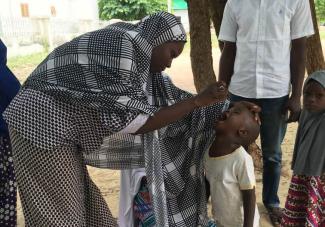eHealth Africa
Fighting polio in spite of insurgency
 eHA
Vaccination matters.
eHA
Vaccination matters.
The terror militia Boko Haram has been active in the region for several years, wreaking havoc on communities with kidnappings, bombs and violence. In Borno alone, the number of displaced people is estimated to be somewhere between 1 million and 2 million people. The World Health Organization has declared a humanitarian crisis in northeastern Nigeria. Malnutrition rates are very high in this part of the country, with some estimates of the number of children whose growth has been stunted as high as 30 %.
Transmission of the polio virus in Nigeria was thought to have stopped in 2015. However, with improving security conditions in the northeast, access to areas once impassable due to violence are opening up. Four cases of wild poliovirus have been reported since August 2016. This is a significant setback in the efforts to eradicate the disease.
For many, polio is a distant threat or a long-forgotten memory. The Salk vaccine was introduced in 1954, and a few years later, the Sabin oral vaccine made mass immunisation possible. Region by region, polio was eliminated from many parts of the world. After India was declared free of the virus in 2014, only three countries were still considered endemic. Nigeria is one of them.
Prior to the current crisis, Nigeria had seen significant progress however. In 2012, 122 cases of paralysis from wild poliovirus were recorded in Nigeria. In 2014, there were only six cases and none in 2015. The new cases, however, show that more needs to be done.
Polio has a high transmission rate, but only one in 200 people develop irreversible paralysis. Young children are at higher risk of becoming paralysed, as are people with weak immune systems.
eHA is assisting the Nigerian government on geospatial mapping and data collection. The goal of the eradication campaign is to vaccinate every child under the age of five years to achieve herd immunity. Teams of vaccinators go to every house at defined intervals to administer vaccines. To do so, they must be able to find every house. Poor road infrastructure, migratory pastoral populations and high birth rates make it difficult to reach every child.
eHA uses satellite images and ground-truthing. Armed with tablets, mobile phones and other digital devices field officers collect information to provide context. They gather information and geo-coordinates concerning settlement names, local health facilities and other relevant background. The base maps they draft guide the vaccination campaigns. Reaching IDPs is a particular challenge. Every child needs four doses, and administering often proves to be difficult when families are displaced.
The response to the polio outbreak this year was rapid and robust in Borno and the surrounding Lake Chad region. The Nigerian government is engaging new strategies to ensure that all children are properly vaccinated. In spite of the Boko Haram insurgency, Borno is making progress in fighting polio with support from the Global Polio Eradication Initiative, which includes eHA and other partners.
Anu Parvatiyar, eHealth Africa

